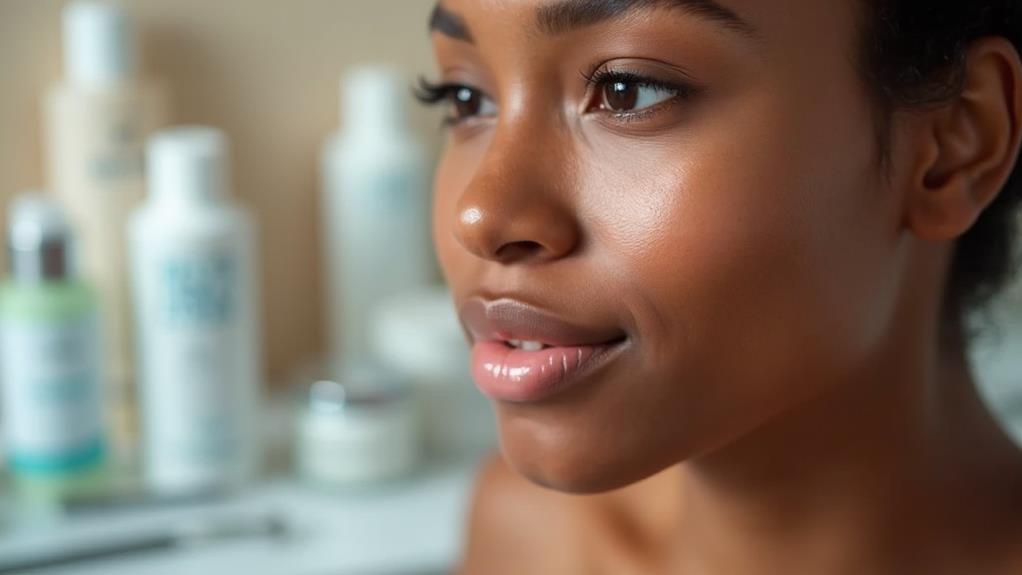Did you know that over 80% of people between the ages of 11 and 30 experience acne, and many are left with lasting scars? If you're among those struggling with acne scars, you're not alone. The journey to even-toned skin can be frustrating, but there's hope. From daily skincare routines to professional treatments, a wide array of options exists to help you say goodbye to those stubborn marks. Whether you're dealing with ice pick scars, rolling scars, or hyperpigmentation, understanding your specific scar type is the first step towards finding the most effective solution for your skin.
Key Takeaways
- Maintain a consistent skincare routine including gentle cleansing, targeted serums, and daily sunscreen application.
- Use over-the-counter products containing AHAs, salicylic acid, vitamin C, or retinol to improve skin texture and tone.
- Consider professional treatments like chemical peels, microdermabrasion, or laser therapy for more significant scar reduction.
- Implement lifestyle changes such as a balanced diet, proper hydration, and stress management to support skin healing.
- Prevent future scarring by avoiding picking at acne, using spot treatments, and consistently protecting skin from sun damage.
Understanding Different Types of Acne Scars

Acne scars come in various forms, each requiring different treatment approaches. You'll commonly encounter three main types: atrophic, hypertrophic, and keloid scars.
Atrophic scars are the most prevalent, appearing as indentations in the skin. They're further categorized into ice pick, boxcar, and rolling scars. Ice pick scars are deep, narrow, and pitted. Boxcar scars are broader with sharp edges, while rolling scars have a wave-like appearance.
Hypertrophic scars, on the other hand, are raised and remain within the boundaries of the original acne wound. They're caused by excess collagen production during healing. Keloid scars are similar but extend beyond the original acne site, forming larger, irregularly shaped growths.
You might also experience post-inflammatory hyperpigmentation (PIH), which isn't a true scar but a temporary discoloration that fades over time.
Understanding these distinctions is significant for selecting the most effective treatment. Ice pick scars may respond well to punch excision, while rolling scars might benefit from subcision. Laser treatments can address various scar types, and chemical peels work well for superficial scarring and PIH.
Daily Skincare Routine for Scar Reduction
A consistent daily skincare routine is essential for reducing the appearance of acne scars. Start by cleansing your face twice daily with a gentle, non-comedogenic cleanser to remove dirt, oil, and dead skin cells.
Follow up with a toner to balance your skin's pH and prep it for better absorption of treatments.
Next, apply a targeted serum containing ingredients like vitamin C, niacinamide, or alpha-hydroxy acids to fade dark spots and promote cell turnover. For raised scars, consider using a retinoid cream to encourage collagen production and smooth skin texture.
Don't forget to moisturize with a non-greasy, hypoallergenic lotion to keep your skin hydrated and protect its barrier function.
During the day, always apply a broad-spectrum sunscreen with at least SPF 30 to prevent further discoloration and protect healing skin.
Incorporate weekly exfoliation using chemical exfoliants like glycolic or lactic acid to remove dead skin cells and promote a more even skin tone.
For deeper scars, consider adding microneedling or chemical peels to your routine, but consult a dermatologist before trying these more intensive treatments.
Natural Remedies for Acne Scars

While conventional treatments are effective, many people turn to natural remedies for acne scars. These alternatives often use ingredients you can find in your kitchen or local health store.
One popular option is aloe vera, known for its healing and anti-inflammatory properties. Apply fresh aloe gel directly to your scars daily to promote skin regeneration.
Another effective remedy is honey, particularly Manuka honey. Its antibacterial properties can help fade scars and improve overall skin tone. Apply a thin layer to affected areas and leave it on for 10-15 minutes before rinsing.
Lemon juice is also a natural skin lightener. Mix it with equal parts water and apply to scars, but be cautious as it can increase sun sensitivity.
Rosehip seed oil is rich in vitamins A and C, which can help reduce the appearance of scars. Massage a few drops into your skin nightly.
Finally, don't underestimate the power of exfoliation. Create a gentle scrub using baking soda and water to remove dead skin cells and promote cell turnover.
Over-the-Counter Products That Work
For those seeking quicker results, over-the-counter products offer a range of effective solutions for achieving even-toned skin. These accessible options can target acne scars and uneven pigmentation without a prescription.
Look for products containing alpha-hydroxy acids (AHAs) like glycolic or lactic acid. They exfoliate dead skin cells and promote cell turnover, gradually fading scars.
Salicylic acid, a beta-hydroxy acid (BHA), penetrates pores and can help prevent future breakouts while improving skin texture.
Vitamin C serums are potent antioxidants that brighten skin and fade dark spots. They also stimulate collagen production, which can help fill in shallow acne scars.
Niacinamide, or vitamin B3, reduces inflammation and regulates oil production while evening out skin tone.
Retinol, a vitamin A derivative, increases cell turnover and collagen production. It's effective for both acne prevention and scar reduction. Start with a low concentration and gradually increase usage to avoid irritation.
Hydroquinone, available in 2% concentrations over-the-counter, is a powerful skin-lightening agent that can fade dark spots and acne marks. Use it cautiously and follow product instructions carefully to avoid over-lightening or irritation.
Professional Treatments for Stubborn Scars

Persistence is key when dealing with stubborn acne scars, but sometimes over-the-counter products just aren't enough. If you've tried various at-home treatments without success, it might be time to contemplate professional options.
One effective treatment is chemical peels, which use stronger acids than those found in over-the-counter products to remove damaged skin layers.
Microdermabrasion is another option, using tiny crystals to exfoliate and improve skin texture.
For deeper scars, dermatologists may recommend laser therapy, which can target specific areas and stimulate collagen production.
Microneedling is gaining popularity for its ability to boost collagen and reduce the appearance of scars. It involves using tiny needles to create controlled micro-injuries, prompting your skin to heal itself.
For severe scarring, dermal fillers can help plump up depressed areas, while subcision involves breaking up scar tissue beneath the skin's surface.
Lifestyle Changes to Promote Healing
Although professional treatments can be effective, adopting certain lifestyle changes can greatly boost your skin's natural healing abilities. Start by prioritizing a balanced diet rich in vitamins A, C, and E, as well as zinc and omega-3 fatty acids. These nutrients support collagen production and reduce inflammation, promoting skin repair.
Stay hydrated by drinking plenty of water throughout the day, which helps flush out toxins and keeps your skin plump and healthy. Protect your skin from sun damage by applying broad-spectrum sunscreen daily, even on cloudy days. UV rays can worsen existing scars and hinder the healing process.
Get enough sleep to allow your body time to repair and regenerate skin cells. Aim for 7-9 hours of quality sleep each night. Manage stress through relaxation techniques like meditation or yoga, as chronic stress can slow down healing and exacerbate skin problems.
Avoid smoking and limit alcohol consumption, as both can impair your skin's ability to heal and cause premature aging.
Preventing Future Acne Scarring

In addition to treating existing scars, it's crucial to prevent future acne scarring. To achieve this, you'll need to adopt a proactive approach to skincare and acne management.
First, resist the urge to pick or squeeze your pimples, as this can lead to inflammation and scarring. Instead, use spot treatments containing salicylic acid or benzoyl peroxide to target individual breakouts.
Develop a consistent skincare routine that includes gentle cleansing, exfoliation, and moisturizing. Use non-comedogenic products to avoid clogging your pores. Incorporate ingredients like retinoids, vitamin C, and niacinamide into your routine, as they can help prevent acne and reduce the likelihood of scarring.
Protect your skin from sun damage by applying a broad-spectrum sunscreen daily. UV exposure can worsen existing scars and make new ones more noticeable.
If you're prone to cystic acne, consult a dermatologist for prescription treatments that can help prevent severe breakouts and subsequent scarring. Consider options like oral antibiotics, hormonal treatments, or isotretinoin for persistent cases.
Lastly, maintain a healthy lifestyle by managing stress, eating a balanced diet, and staying hydrated. These factors can greatly impact your skin's overall health and its ability to heal without scarring.


